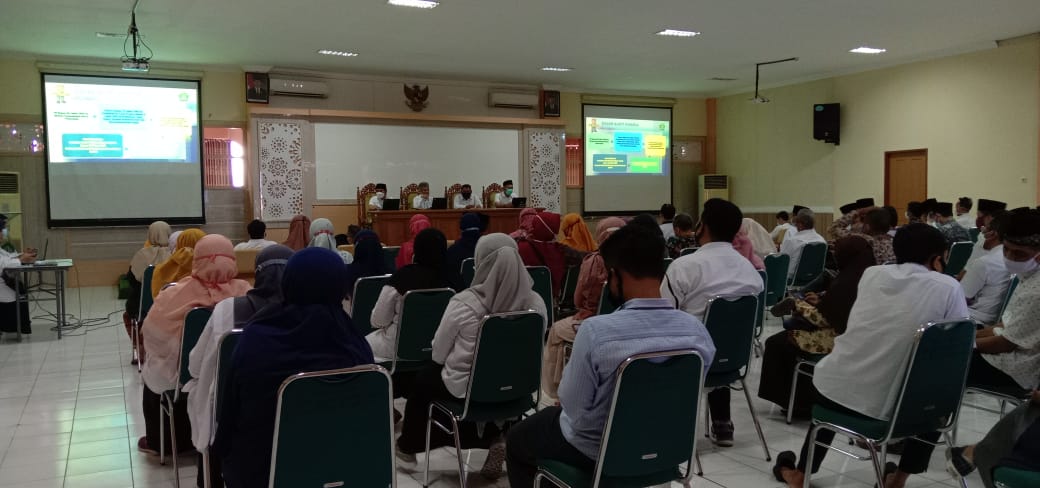VERSI INDONESIA
IAIN Kediri Newsroom – Inspektorat Jenderal Kementerian Agama Republik Indonesia melakukan kunjungan ke IAIN Kediri dalam rangka audit pelaksanaan tugas dan fungsi tahun anggaran 2020 pada IAIN Kediri. Pelaksanaan audit kinerja ini akan berlangsung selama dua minggu mulai tanggal 16 April 2021 hingga 4 Mei 2021.
Pada hari Senin kemarin (19/4) Tim Auditor Inspektorat Jenderal melaksanakan entry meeting audit kinerja di Aula Lantai IV IAIN Kediri. Acara pembukaan ini dihadiri oleh para jajaran pimpinan rektorat, fakultas, dan lembaga IAIN Kediri.
Andewi Susetyo, selaku Pengendali Teknis pada audit ini menyatakan bahwa audit kinerja saat ini telah berbasis 2.0. “Sebelumnya ini ada audit kinerja 1.0 dan sekarang berubah menjadi audit kinerja 2.0. Perubahan system audit dari 1.0 menjadi 2.0 karena empat alasan,” ujar Andewi. (1) capaian audit kinerja belum menggambarkan kinerja tugas dan fungsi satuan kerja; (2) penilaian kinerja sangat tergantung pada besaran anggaran yang dikelola; (3) capaian tingkat kepuasan layanan pada stakeholders belum terukur; dan (4) outcome yang dicapai auditi belum terukur.
Ada empat fungsi utama yang diaudit pada pelaksanaan audit kinerja kali ini yakni perencanaan, pelaksanaan, evaluasi dan pelaporan, serta pencapaian hasil (outcome). Tim Auditor menyampaikan bahwa tujuan audit kinerja ini adalah; pertama, untuk mendapatkan keyakinan yang memadai terhadap satuan kerja yang meliputi audit atas aspek kehematan (ekonomis), efisiensi, dan efektivitas. Kedua, untuk memberikan nilai tambah dan meningkatkan operasional satuan kerja. Ketiga, untuk memberikan peringatan dini atas kinerja dan pencapaian sasaran dan/atau tujuan yang telah direncanakan satuan kerja.
Rektor IAIN Kediri, Nur Chamid, dalam sambutan acara mengingatkan bahwa audit kinerja ini tidak hanya sekadar kegiatan audit saja, namun juga untuk perbaikan ke depannya. “Audit ini bukan untuk mencari kesalahan, tapi sesungguhnya adalah mengarahkan bagaimana kinerja itu biar lebih tepat untuk kita,” ungkapnya.
Sumber: Humas IAIN Kediri
Penulis: Zuhrufi Latifah
Editor: Ropingi el Ishaq
VERSI INGGRIS
State Islamic Institute of Kediri Newsroom – Inspectorate General of Ministry of Religious Affairs visited the State Islamic Institute of Kediri to audit the implementation of task and function of budget year 2020 at the State Islamic Institute of Kediri. The performance audit would take place on 16 April 2021 to 4 May 2021.
The auditor team of the Inspectorate General held an entry meeting of the performance audit in the Fourth Floor Hall of the State Islamic Institute of Kediri on Monday (19/4). The entry meeting was attended by the heads of rectorate, faculties, as well as departments of the State Islamic Institute of Kediri.
Andewi Susetyo, the technical controller on this audit stated that the current performance audit was based on 2.0. “Previously there was performance audit 1.0 and now it transforms to performance audit 2.0. The change of audit system from 1.0 to 2.0 was because of four reasons,” said Andewi. (1) The performance audit outcome had not yet portrayed the performance task and function of the working unit; (2) the performance assessment very depended on the amount of budget that was managed; (3) the outcome of service satisfaction rate of the stakeholders was not measurable yet; and (4) the outcome achieved by the auditee was not measurable yet.
There were four main functions audited at this performance audit namely planning, implementation, evaluation and report, as well outcome. The auditor team said that the aims of the performance audit were; firstly, to get adequate trust on the working unit that includes economical, efficiency, and effectivity aspect; secondly, to give additional value and enhance the operational of the working unit; thirdly, to give early warning for the performance and target achievement and/or the planned goal by the working unit.
The Rector of the State Islamic Institute of Kediri, Nur Chamid, in the opening of entry meeting reminded that the performance audit was not merely an audit, but it is also for improvement in the future. “The audit was not intended to find mistakes, but it is actually to direct us how the performance fits for us,” he said.
Source: Public Relation of the State Islamic Institute of Kediri
Writer: Zuhrufi Latifah
Editor: Ropingi el Ishaq


